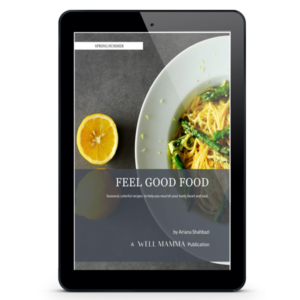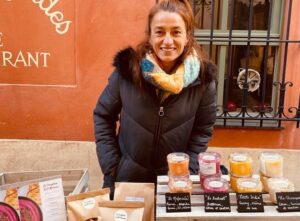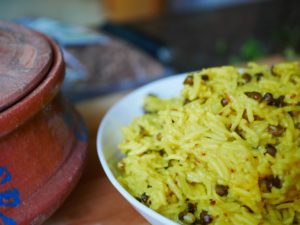My mission with Well Mamma is to help people put good energy into every part of the “fooding” process. From doing their best to source good ingredients to fully enjoying eating (and sharing) their meals. Unfortunately, this process can be totally sabotaged by the way our Western society works.
Many obstacles can get in the way. Some are obvious: we lead busy lives, eat on the go, don’t have much time to cook, are surrounded by processed foods, don’t have easy access to farmers’ markets, and the list goes on. But in my experience working with clients, those are very pragmatic issues that are “figure-out-able”. There is, however, something that is far more insidious and can be more challenging to tackle: the stress around food.
The thin = healthy myth
As you probably know if you’ve been following me, I live in France now and am delighted to be in a country where food and mealtime are considered to be sacred. I’ve always felt that the French mastered the art of balanced eating. They enjoy all foods and aren’t overly obsessed with dieting, exercising, and body image. However, I was reminded today that the cult of being young and thin is alas permeating the culture here too. As I was stuck at a traffic light, I saw a beauty salon next to me and the sign said, “Minceur, Anti-age, Beaute”. In English: “Slimming, anti-aging, beauty”. Like the three all go together. Be thin, look younger and you’ll be beautiful. And I’ve seen that sort of sign countless times without even batting an eyelash. And it struck me: we see this sort of communication everywhere, all the time and we don’t realize how the underlying message impacts our subconscious and how damaging it can be to our self-worth and our enjoyment of life.
It reminded me of the interview I did with Florence Gilet, a body psychology coach I met in Dubai years ago. She was the first person who introduced me to the concept of “health at any size“, and who opened my eyes to the fact that we live in a society where being thin equals being healthy, happy, and successful. And almost everyone – including me – has at some point bought into this idea, and spent money on trying to achieve it. We follow a diet, a method, a regimen, we get supplements, we restrict ourselves, we over-exercise, in the name of being thin. As a result, we get scared of the thing that actually feeds (and can heal) our body, nourishes our soul and that is central to most social gatherings: food.
How you feel about the food you eat matters
Did you know that when we look at the food that we are about to consume and look forward to it, our mouths water and we already start producing important substances, including electrolytes, antibacterial compounds and various enzymes that help with digestion? And if we consider the same food with disgust, fear, or stress, our brain does not send the same signals to the body to produce these substances. Stress can affect digestion and what nutrients the intestines absorb. Research shows that the enteric nervous system (the part of the nervous system that manages our digestion – it is often referred to as our “second brain”) will signal to the brain that digestion should slow down so that the body can focus its energy on combatting the stressor or perceived threat. Stress may come in different shapes and sizes: you just had a fight your spouse, you are constantly checking your phone for notifications, you have too many things to do and not enough time, you only have 10 minutes to eat, you are worried the food you are eating will make you fat, etc. But whatever the reason, the body just labels it as stress. One nutritionist I met, Laura Holland, from BeU, once told me that her clients’ digestive wellbeing was often affected by stress that comes from guilt. She gave me this example: two people are waiting in line at Starbucks. One is hesitant to get the blueberry muffin, they’re afraid it will make them fat, but then decides it will be their “cheat meal”, they buy it, eat it and feel guilty about it. They report that this muffin didn’t go down so well. The other person sees the muffin, loves the idea of having it. buys it, eats it and loves every minute of it. They report not having issues digesting it. I did a podcast episode with her here if you are interested – she is a great resource when it comes to nutrition and energy.
The stress that comes from being time-pressed
Our society promotes being busy. Busy is productive and relaxing is lazy – unless you are on holiday after having been busy and productive for months on end, in which case it is more acceptable. Many people have jam-packed schedules. Some just have a lot of things to do, while others feel guilty doing nothing and make sure they are always overstretched. In the end, the result is the same: once they get faced with having to cook a meal, they are stressed by time. Time to think about what to make, time to shop for groceries, time to actually make it, and then, time to sit and enjoy it. During the pandemic work-from-home period, it of course got worst because the eating thing had to be done twice! For the ones who cooked, once they actually sat down at the table, they were often too stressed to savor their meal. And for the ones who didn’t cook, if they did eat, it was often take-out, eaten in front of their laptops working at the same time.
Food wasn’t meant to be experienced this way. Luckily, there are really busy people who manage to have mindful eating habits. Here are some tips I’ve picked up by watching them:
- They make time to eat and literally block their calendar at lunchtime
- They sit at the dinner table to eat – either alone or with their family/roommates
- They get rid of distractions: no tv, phone, tablet or laptop
- Even if they have little time, they mostly prepare their own food, with simple ingredients – this is important because it actually creates a connection with what they are about to consume
- They don’t wolf their food down – many eat quite slowly
Just following these guidelines goes a long way in helping to enjoy and metabolize food.
My point?
Enjoy your food. Aspire to balance. Become more conscious of the messages we get from media (choose the people you follow on Instagram wisely!). See food preparation and consumption as a form of self-care. Even if you don’t have much time, the little you have should be spent taking pleasure in feeding yourself. I initially work with clients to help them learn how to cook healthy, delicious foods and provide them with tips and techniques to save time and money. But over time, our weekly rendez-vous become a “me-time” they cherish, where they familiarize themselves with different types of produce, spices, herbs, go-to time-saving, flavor-giving pantry items and deepen their connection with food. It becomes a mindfulness exercise that ends up spilling over to their everyday life, which is ultimately how it should be.
So if you catch yourself eating in situations where you have feelings of guilt, stress, or restriction, know that your system is not going to like it. Slow down. Listen to your body, get excited about what you are about to eat and savor every minute of it. Chances are it will boost your overall wellness.
Interested in getting reconnected with cooking and food? Contact me to book a private session.




